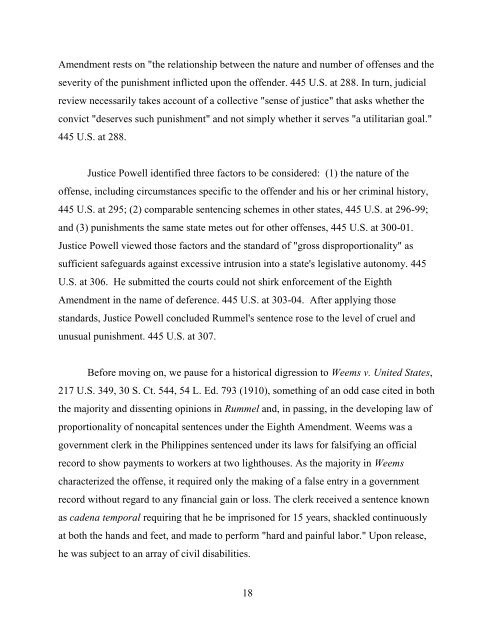State v. Proctor - Kansas Judicial Branch
State v. Proctor - Kansas Judicial Branch
State v. Proctor - Kansas Judicial Branch
Create successful ePaper yourself
Turn your PDF publications into a flip-book with our unique Google optimized e-Paper software.
Amendment rests on "the relationship between the nature and number of offenses and the<br />
severity of the punishment inflicted upon the offender. 445 U.S. at 288. In turn, judicial<br />
review necessarily takes account of a collective "sense of justice" that asks whether the<br />
convict "deserves such punishment" and not simply whether it serves "a utilitarian goal."<br />
445 U.S. at 288.<br />
Justice Powell identified three factors to be considered: (1) the nature of the<br />
offense, including circumstances specific to the offender and his or her criminal history,<br />
445 U.S. at 295; (2) comparable sentencing schemes in other states, 445 U.S. at 296-99;<br />
and (3) punishments the same state metes out for other offenses, 445 U.S. at 300-01.<br />
Justice Powell viewed those factors and the standard of "gross disproportionality" as<br />
sufficient safeguards against excessive intrusion into a state's legislative autonomy. 445<br />
U.S. at 306. He submitted the courts could not shirk enforcement of the Eighth<br />
Amendment in the name of deference. 445 U.S. at 303-04. After applying those<br />
standards, Justice Powell concluded Rummel's sentence rose to the level of cruel and<br />
unusual punishment. 445 U.S. at 307.<br />
Before moving on, we pause for a historical digression to Weems v. United <strong>State</strong>s,<br />
217 U.S. 349, 30 S. Ct. 544, 54 L. Ed. 793 (1910), something of an odd case cited in both<br />
the majority and dissenting opinions in Rummel and, in passing, in the developing law of<br />
proportionality of noncapital sentences under the Eighth Amendment. Weems was a<br />
government clerk in the Philippines sentenced under its laws for falsifying an official<br />
record to show payments to workers at two lighthouses. As the majority in Weems<br />
characterized the offense, it required only the making of a false entry in a government<br />
record without regard to any financial gain or loss. The clerk received a sentence known<br />
as cadena temporal requiring that he be imprisoned for 15 years, shackled continuously<br />
at both the hands and feet, and made to perform "hard and painful labor." Upon release,<br />
he was subject to an array of civil disabilities.<br />
18

















